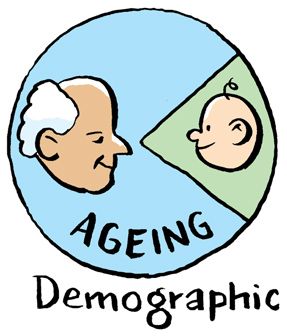Budget 2023 must deliver for Older People

Ireland has an increasingly ageing population and it is imperative, both from the perspective of the individual and the supporting structures, that ageing in place becomes the default approach.
Adequate Income
Data published by both the Central Bank and the Central Statistics Office indicate that the current increases in the cost of living are disproportionately impacting older households, with those aged 65+ experiencing an increase of 7.2 per cent in the year to March 2022, compared to 6.7 per cent for the general population (the overall inflation rate was 7.8 per cent in May 2022). Our Housing Costs and Poverty 2022 policy briefing also noted that three out of ten older adults are living in poverty after paying housing costs. As our population ages, and are more likely to be renting for longer, they must have an adequate income.
Social Justice Ireland proposes a single-rate universal state social welfare pension from January 2023 at the rate of the State Pension (Contributory). The significant additional expenditure required could be funded through reform of Ireland’s system of pension-related tax reliefs, and through a moderate increase in Employer PRSI, as detailed in our report on the Universal Pension from March 2018. This would involve standard-rating the tax break on all private pension contributions.
Housing Supports
According to Eurostat, 13.2 per cent of Ireland’s population aged 65+ are living in a dwelling with a leaking roof, damp walls, floors or foundation, or rot in window frames or floor, the highest rate since 2015, and that’s before accounting for illness or disability which requires further home adaptations. That equates to 98,000 older people. Research by TILDA puts the rate of people aged 50+ living in substandard accommodation at 57.8 per cent, with the most prevalent housing condition issues relating to damp, mould or moisture.
The expenditure in respect of the Housing Aid for Older People plummeted from €30.8m in 2010 to just €12.8m in 2020, while Housing Aid for People with a Disability reduced from €39.8m to €26.6m in the same period. Building on moderate increases since 2015, the total amount paid in respect of these grants in 2021 was €56.5 million in respect of 10,283 grants. To provide for a standard of living into older age, the cuts to Housing Aid for Older People and Housing Aid for People with a Disability must be restored, starting with an additional allocation of €85m in Budget 2023.
Home Care
Being well at home is also about the availability of care supports appropriate to the needs of older people. According to the most recently published HSE Performance Reports there were 474 delayed discharges of older people up to the end of September 2021, an increase on the previous year, and 393 older people awaiting homes support packages. The Government committed to the introduction of a statutory right to home care in 2021, however we are yet to see any detail of this over a year later.
Social Justice Ireland believes that ultimately it should allow for choice on the part of the care recipient from a ‘basket of goods’ that ranges from healthcare to home care, personal care to social inclusion. In the meantime, an increase in the current provision of home support packages to older people is urgently required. The average number of hours provided by the HSE per older home care recipient for the first nine months of 2021 was 7.2 hours per week. This is insufficient. Budget 2023 must include an allocation of €90m for additional home care supports and address the most current waiting lists.
The Community and Voluntary sector provide a range of key supports for older people, from befriending and social inclusion supports, to home care and assistive technologies. These supports are particularly important for those older people living with dementia and their families. The additional revenue supports to frontline Community and Voluntary organisations dealing with the Covid-19 emergency were welcome, however for these supports to be sustainable post-Covid, a multi-annual increase in allocation is required starting with an allocation of €35m in Budget 2023.
Nursing Homes
Approximately 3.7 per cent of all people aged 65+ reside in nursing homes, as per Census 2016. While the health focus should be on enabling people to age at home, for those for whom nursing home care is appropriate, nursing home policy must take cognisance of the vulnerability of residents, their advanced medical conditions, and the retention of a quality of life. Social Justice Ireland welcome the inclusion of measures to safeguard nursing home residents in the Programme for Government. This must be adequately funded and address both the shortfall in coverage and the disparities of funding between HSE-led and private and voluntary facilities. It must also be provided in consultation with nursing home providers, residents, families and carers. Social Justice Ireland proposes an increase in funding for Nursing Homes to take account of demographic change. This would cost an additional €35m in Budget 2023.
Safeguarding
The first National Adult Safeguarding Day was held on the 19th November 2021. Of the 10,153 safeguarding reports made to the HSE National Safeguarding Office in 2020, more than a third (3,412) were made by people aged 65. The most prevalent types of abuse reported for this age group were psychological, physical and financial. Half of all allegations made by people aged 65+ in 2020 concerned members of the complainants immediate family, while almost one quarter (23 per cent) of complaints were about another service user or peer, and 15 per cent were against staff. Clearly more is needed to support adult safeguarding in Ireland with an increase in safeguarding supports at local and national level. Budget 2023 should contain an additional €12.5 million to increase the capacity of the HSE Safeguarding Teams and develop a public awareness programme to support older people experiencing abuse.
Budget Choices 2023 is available to download now.